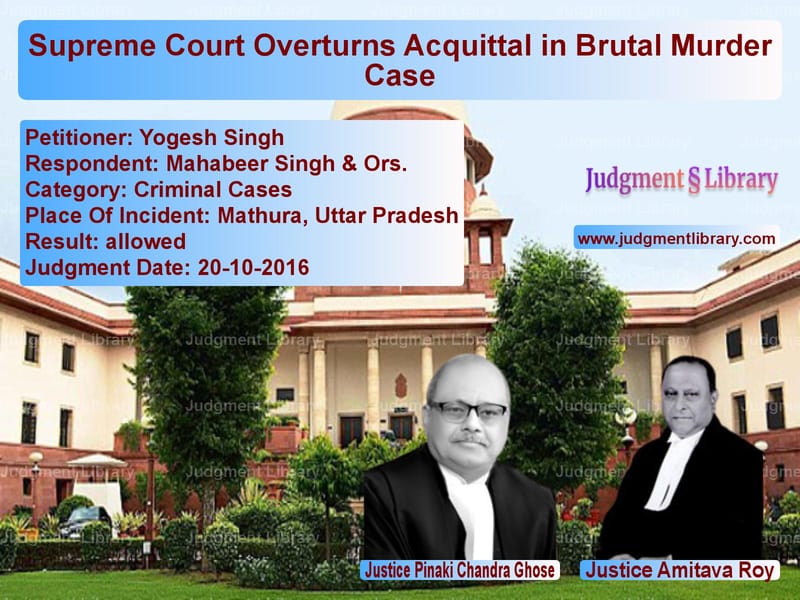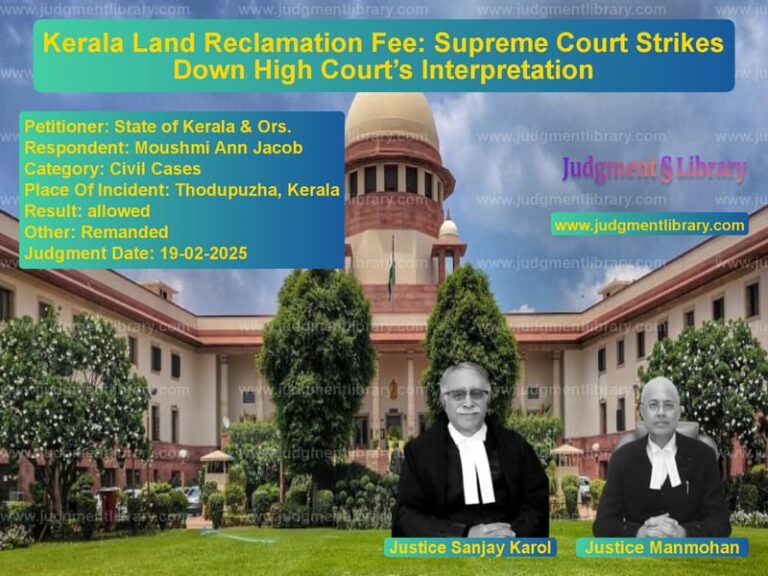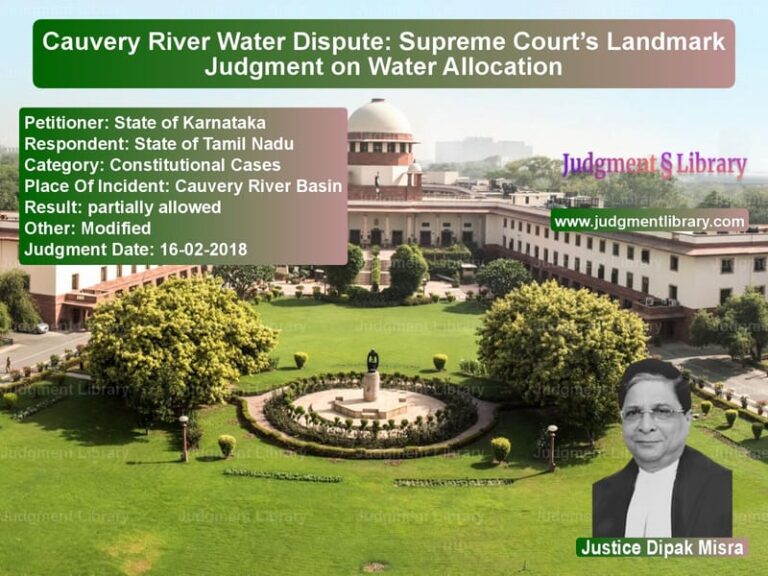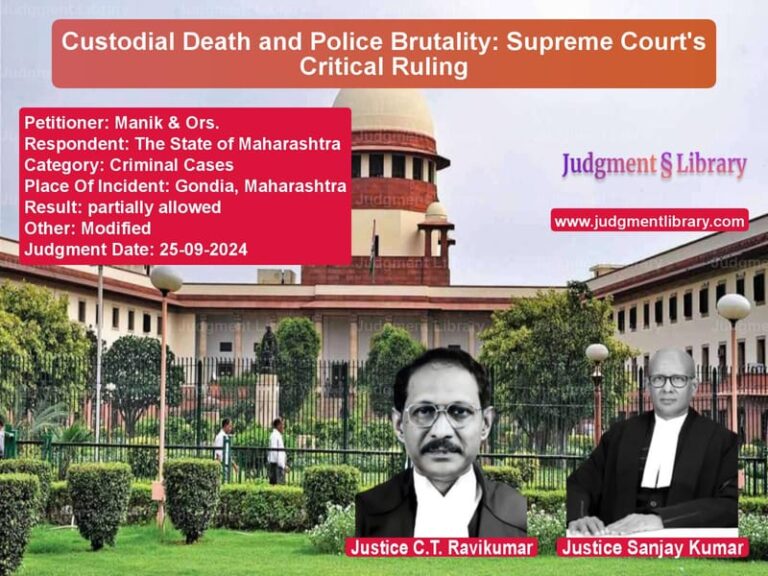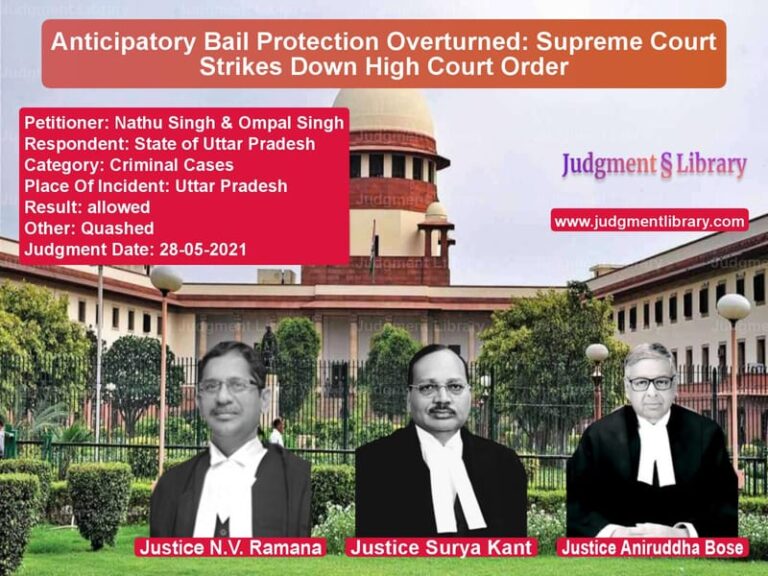Supreme Court Overturns Acquittal in Brutal Murder Case
The Supreme Court of India recently delivered a landmark judgment in the case of Yogesh Singh vs. Mahabeer Singh & Ors., reversing the acquittal of six accused individuals in a brutal murder case. The ruling reinstated the trial court’s conviction, emphasizing the importance of credible witness testimony and the proper appreciation of evidence.
Background of the Case
The case revolves around the gruesome murder of Mohan Singh, which occurred on June 26, 1982, in Village Garh Umrao, Tehsil Sadabad, District Mathura, Uttar Pradesh. Mohan Singh was attacked and beheaded in broad daylight while he was on his way home with his minor daughter.
Chronology of Events
- June 26, 1982 (Morning): Mohan Singh, along with his minor daughter, was heading home when he was accosted by six accused individuals, including Mahabeer Singh, Phal Singh, and Om Prakash.
- The accused restrained Mohan Singh and violently attacked him using sharp weapons, ultimately severing his head.
- Eyewitnesses: Mohan Singh’s father, Kalyan Singh (PW-1), and another villager, Bani Singh (PW-2), witnessed the crime from a distance.
- Following the attack, the accused attempted to drag the body away but fled when villagers raised an alarm.
- FIR Lodged: Kalyan Singh immediately filed a complaint at Sadabad Police Station, leading to the registration of Case Crime No. 139 of 1982.
Investigation and Trial
The police launched an investigation, collecting evidence and recovering weapons, including a blood-stained Phawara (spade) used in the attack.
- Post-Mortem Report: Conducted by Dr. K.C. Jain (PW-4), it confirmed that Mohan Singh’s head was severed and attributed the cause of death to excessive hemorrhage and shock.
- Charge-Sheet Filed: Seven accused individuals were charged under Sections 302 (Murder), 147 (Rioting), 148 (Armed Rioting), and 379 (Theft) of the Indian Penal Code.
- Sessions Court Judgment (1983): Six of the accused were convicted and sentenced to life imprisonment, while one was acquitted.
High Court Reverses Conviction
The convicted individuals appealed their conviction before the Allahabad High Court, which, on February 17, 2012, overturned the trial court’s judgment and acquitted the accused.
The High Court cited multiple reasons:
- Unreliable Witness Testimony: It held that the prosecution witnesses were interested parties and possibly biased.
- Absence of Independent Witnesses: The court doubted why no neutral villagers testified.
- Delay in FIR Dispatch: The court noted a delay in forwarding the FIR to the magistrate.
- Contradictions in Evidence: The court highlighted minor inconsistencies in witness statements.
Supreme Court’s Reversal of Acquittal
The son of the deceased, Yogesh Singh, challenged the acquittal in the Supreme Court, arguing that the High Court failed to appreciate the weight of the evidence correctly.
Key Observations by the Supreme Court
1. Witness Testimonies Are Reliable
The Supreme Court rejected the High Court’s skepticism regarding the credibility of Kalyan Singh (PW-1), Bani Singh (PW-2), and Lajjawati (PW-5). It held:
“The presence of these witnesses at the scene is natural, and their testimonies are consistent and corroborated by medical evidence.”
2. No Requirement for Independent Witnesses
The Court ruled that the absence of independent witnesses was not fatal to the prosecution’s case:
“In cases of such brutality, it is not uncommon for neutral witnesses to refrain from testifying out of fear.”
3. Minor Discrepancies Do Not Undermine Prosecution Case
The Court emphasized that minor contradictions in witness statements do not necessarily invalidate their credibility:
“Experience shows that witnesses do exaggerate. However, as long as their core testimony remains consistent, it cannot be discarded.”
4. Motive Is Not Essential in Presence of Direct Evidence
The High Court had doubted the motive behind the murder. The Supreme Court held that in cases with direct eyewitness testimony, the absence of a motive is inconsequential.
Supreme Court’s Final Verdict
The Supreme Court reinstated the Sessions Court’s conviction, ruling:
“The High Court’s findings are not plausible. The trial court correctly analyzed the evidence, and the conviction stands reinstated.”
The convicted individuals were directed to surrender within a week to serve their life sentences.
Key Takeaways from the Judgment
- High evidentiary standards for overturning trial court verdicts: Acquittals should not be granted merely due to minor discrepancies.
- Credibility of eyewitnesses: Close relatives of the deceased can be reliable witnesses.
- Delay in FIR dispatch does not necessarily invalidate the case: Technical delays in procedural aspects do not undermine strong direct evidence.
- Legal precedent for future criminal cases: The ruling strengthens the principle that minor contradictions do not dilute a prosecution’s case.
Conclusion
The Supreme Court’s judgment in Yogesh Singh vs. Mahabeer Singh & Ors. sets an important precedent for the treatment of eyewitness testimony, the importance of corroborative evidence, and the limitations of appellate review in criminal cases. The ruling reaffirms the principle that justice should not be derailed due to minor procedural irregularities, ensuring that criminals do not go unpunished due to technical loopholes.
Don’t miss out on the full details! Download the complete judgment in PDF format below and gain valuable insights instantly!
Download Judgment: Yogesh Singh vs Mahabeer Singh & Ors Supreme Court of India Judgment Dated 20-10-2016.pdf
Direct Downlaod Judgment: Direct downlaod this Judgment
See all petitions in Murder Cases
See all petitions in Bail and Anticipatory Bail
See all petitions in Attempt to Murder Cases
See all petitions in Judgment by Pinaki Chandra Ghose
See all petitions in Judgment by Amitava Roy
See all petitions in allowed
See all petitions in supreme court of India judgments October 2016
See all petitions in 2016 judgments
See all posts in Criminal Cases Category
See all allowed petitions in Criminal Cases Category
See all Dismissed petitions in Criminal Cases Category
See all partially allowed petitions in Criminal Cases Category

